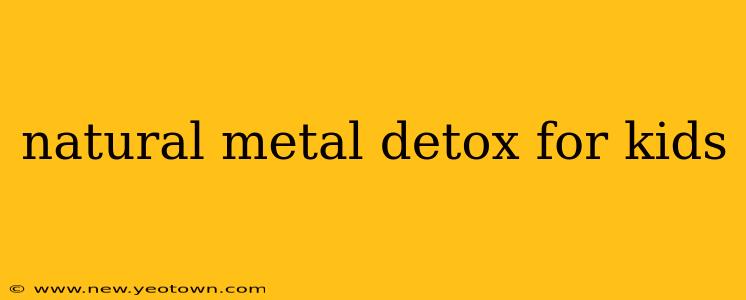As parents, we strive to provide the best possible care for our children, ensuring their health and well-being. But in our modern world, exposure to heavy metals like lead, mercury, and arsenic is a growing concern. These toxins can accumulate in the body over time, potentially impacting a child's development and overall health. While professional medical intervention is crucial in cases of significant metal toxicity, exploring natural approaches to support your child's body in its detoxification process can be a valuable addition to your strategy. This guide will explore safe and effective methods for supporting natural metal detoxification in children. Remember, always consult with your pediatrician before starting any new health regimen for your child.
What are Heavy Metals and Why are They Harmful to Children?
Heavy metals are naturally occurring elements that are toxic even in small amounts. Children are particularly vulnerable due to their still-developing systems and their tendency to put things in their mouths. Exposure can come from various sources, including:
- Lead: Old paint, contaminated soil, certain water sources.
- Mercury: Amalgam dental fillings (though less common now), contaminated fish (especially larger predatory fish).
- Arsenic: Contaminated water, certain pesticides.
- Cadmium: Certain plastics, cigarettes, contaminated food.
These metals can interfere with vital bodily functions, impacting brain development, immune function, and overall growth. Symptoms of heavy metal toxicity in children can be subtle and may include behavioral issues, learning difficulties, digestive problems, and fatigue. Early intervention is key.
How Can I Naturally Support My Child's Metal Detoxification?
The following strategies are designed to support the body's natural detoxification processes, not to magically remove metals overnight. It’s a supportive approach that works best in conjunction with a healthy lifestyle and, importantly, professional guidance.
1. Prioritizing Nutrition:
A nutrient-rich diet is fundamental to supporting detoxification. Focus on:
- Fruits and Vegetables: Rich in antioxidants and fiber, which help bind to and eliminate toxins. Choose a variety of brightly colored fruits and vegetables.
- Chlorella and Spirulina: These algae are known for their ability to bind to heavy metals and assist in their elimination. Always choose high-quality, reputable brands and follow dosage instructions carefully.
- Cilantro and Parsley: These herbs have shown promise in supporting metal excretion.
- Garlic: Contains sulfur compounds that may help detoxify the body.
2. Hydration is Key:
Ensuring your child drinks plenty of clean, filtered water throughout the day is crucial. Water helps flush out toxins from the body.
3. Supporting Gut Health:
A healthy gut is essential for overall health and detoxification. Encourage a diet rich in probiotics (yogurt, kefir) and prebiotics (fiber-rich foods) to support a balanced gut microbiome.
4. Minimizing Exposure to Toxins:
Reduce your child’s exposure to heavy metals by:
- Testing your home for lead paint: If you live in an older home, lead paint testing is crucial.
- Filtering your water: Use a high-quality water filter to remove contaminants.
- Choosing low-mercury fish: Opt for smaller, lower-on-the-food-chain fish like salmon or sardines.
- Avoiding exposure to cigarette smoke: Secondhand smoke contains heavy metals and other toxins.
5. Gentle Exercise and Play:
Regular physical activity, even simple play, promotes healthy circulation and supports detoxification.
What are the signs of heavy metal toxicity in children?
This is a crucial question, as early detection is essential. Signs can be subtle and mimic other conditions, making diagnosis challenging. Some common symptoms include:
- Developmental delays: Difficulties with speech, motor skills, or cognitive development.
- Behavioral problems: Hyperactivity, irritability, aggression, or difficulty concentrating.
- Gastrointestinal issues: Diarrhea, constipation, vomiting, or abdominal pain.
- Neurological symptoms: Headaches, tremors, seizures, or numbness.
- Fatigue and lethargy: Persistent tiredness and lack of energy.
It's important to note: These symptoms don't automatically indicate heavy metal toxicity. A thorough medical evaluation by a pediatrician or specialist is necessary for accurate diagnosis.
What supplements can help with heavy metal detoxification in children?
While nutrition plays a vital role, some parents explore specific supplements. However, it's crucial to consult your pediatrician before giving your child any supplements. Some commonly discussed supplements include chlorella, spirulina, and zeolite, but their effectiveness and safety in children require further research and individual assessment by a healthcare professional. Self-treating can be risky.
Conclusion:
Supporting your child's natural detoxification pathways is an important part of their overall health and well-being. By focusing on a healthy diet, minimizing exposure to toxins, and working closely with your pediatrician, you can take proactive steps to support your child's development and protect them from the harmful effects of heavy metals. Remember, this information is for educational purposes only and should not be considered medical advice. Always seek guidance from a qualified healthcare professional for any health concerns.

